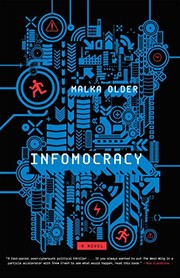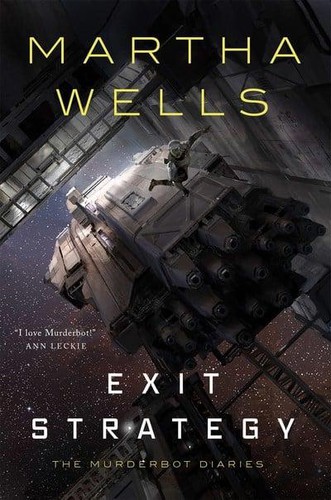polymerwitch wants to read Infomocracy by Malka Older

Infomocracy by Malka Older
It's been twenty years and two election cycles since Information, a powerful search engine monopoly, pioneered the switch from warring …
I like speculative fiction and political philosophy
This link opens in a pop-up window

It's been twenty years and two election cycles since Information, a powerful search engine monopoly, pioneered the switch from warring …

"Martha Wells's Hugo, Nebula, Alex, and Locus Award-winning, New York Times and USA Today bestselling series, The Murderbot Diaries, comes …
I usually find Graeber's work a bit annoying as I agree with the conclusions, but I find his arguments for how to get there lacking. I had high hopes for this book as the premise was interesting. Unfortunately, this book was even more frustrating that his others. I enjoyed the critique of eurocentric views on civilization, and I liked that the book argues against a narrative of progress through feudal lords and then capitalism.
However, a main argument in the book is against the idea that large population governance is not inherently oppressive. I wholly reject this idea. The arguments Graeber and Wengrow make are hundreds of pages long and never get beyond "well there is no evidence of a monarchy so they must have had people's assemblies and been democratic." The city, they infer, is therefore a structure we can have without oppressive relations. There is then much advocating …
I usually find Graeber's work a bit annoying as I agree with the conclusions, but I find his arguments for how to get there lacking. I had high hopes for this book as the premise was interesting. Unfortunately, this book was even more frustrating that his others. I enjoyed the critique of eurocentric views on civilization, and I liked that the book argues against a narrative of progress through feudal lords and then capitalism.
However, a main argument in the book is against the idea that large population governance is not inherently oppressive. I wholly reject this idea. The arguments Graeber and Wengrow make are hundreds of pages long and never get beyond "well there is no evidence of a monarchy so they must have had people's assemblies and been democratic." The city, they infer, is therefore a structure we can have without oppressive relations. There is then much advocating for the city as a body politic.
I just don't see this as being likely or even desirable. The culture of the city and the community life that brings are something that I think can be valuable, but I find no need or desire for an overarching body politic for a physical space just because we conceive an arbitrary line around it. I don't care how "democratic" it is. I believe politics, justice, and governance are pluralistic and need to be worked out on a case by case basis, depending on context, and involve those effected.
Can we have a future with technology and high standards of living in such a pluralistic society? I think so, but admittedly it would look nothing like what we have now, and would not look like early agricultural adoption either. We can make the future what we want without trying to erect our pet political strategies onto a group of people living in a single location.
That's what's so frustrating I guess. The book begins to give us the space to dream of a possible future, but then just settles on another system of governance that is appropriated from an incomplete picture of some Indigenous groups and some early Europeans.
If we were born in another world what form would the shadows cast upon the walls of our cave take? What mythologies and art would inform our identity? What are the limits that malicious people have to do harm through warping and confining our realities? How does the society around me shape the person I am at any given time?
Piranesi explores these questions in a labyrinth of an endless house full of statues that is flooded by the sea. The answers are in the faces of our neighbors and in the hushing pose of the faun.